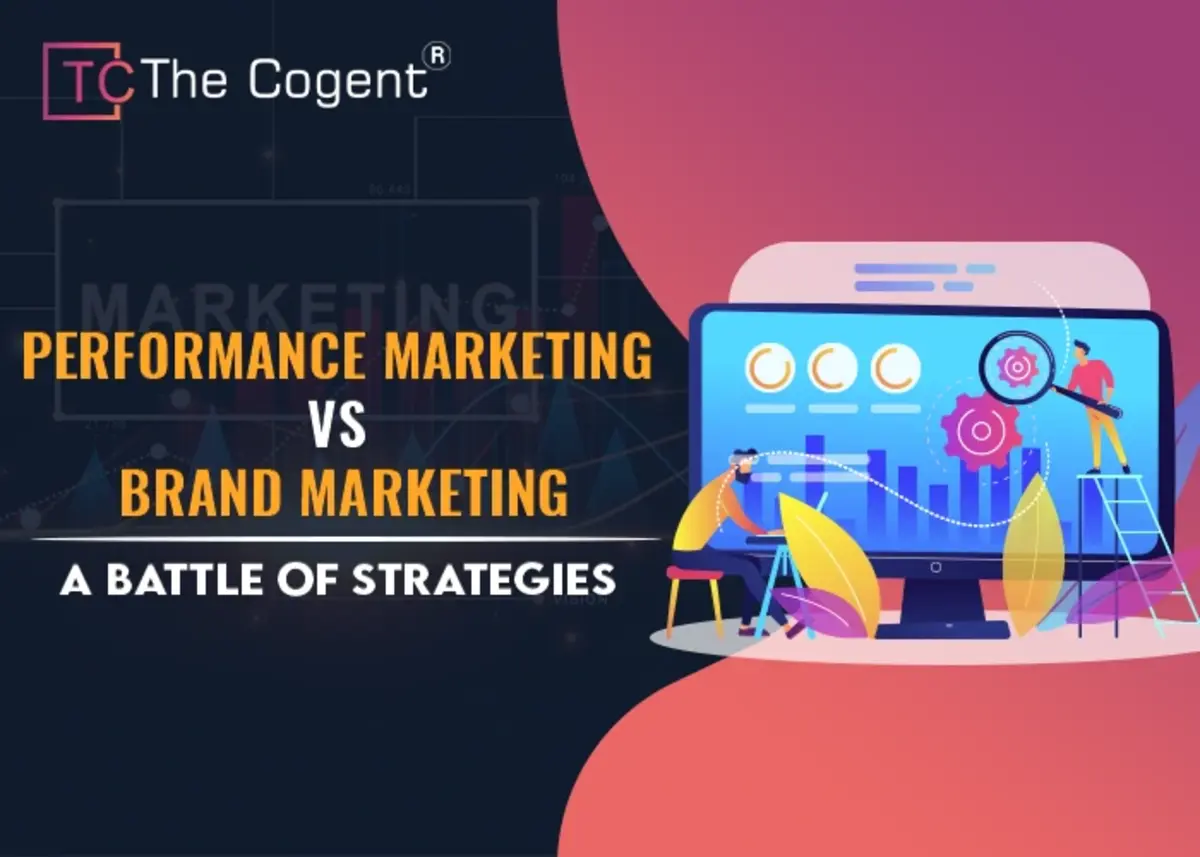In the World of marketing, two terms often come up in discussions ‘Performance Marketing’ and ‘Brand Marketing.’ But what exactly do these terms mean, and how do they differ? In this article, we’ll delve into marketing strategies, breaking down the shade of Performance Marketing vs Brand Marketing. So, if you’re a performance marketer, digital marketer, or just someone curious about the field, let’s embark on this journey to uncover the secrets behind these marketing methodologies.
Table of Contents
1. Introduction
2. Performance Marketing: Navigating the Data-Driven
3. Brand Marketing: Building Emotional Connections
4. Differences Between Performance vs Brand Marketing
5. When to Choose Performance Marketing
6. When to Choose Brand Marketing
7. The Hybrid Approach
8. Measuring Success: KPIs in Performance Marketing
9. Measuring Success: Brand Metrics in Brand Marketing
10. Case Studies: Real-World Applications
11. Conclusion
12. FAQs about Performance Marketing vs Brand Marketing
Introduction
Before we dive into the difference between Performance Marketing vs brand Marketing, let’s start with the basics. These two marketing approaches share a common goal: to drive business growth. However, their paths to achieving this goal are markedly different.
Understanding Performance Marketing
Performance Marketing is the digital marketing strategy that’s all about measurable results. It’s like using a GPS to reach your destination; you have precise metrics to guide you. In this approach, marketers focus on specific actions, such as clicks, conversions, or sales. Every campaign is meticulously tracked and analyzed.
The Power of Data
Data is the heart and soul of Performance Marketing. Marketers gather and analyze data to understand customer behaviour, optimize campaigns, and maximize ROI. It’s a realm of A/B testing, click-through rates, and conversion funnels.
Understanding Brand Marketing
Brand Marketing, on the other hand, is more like a scenic road trip. It’s about creating a lasting impression, and an emotional connection with your audience. Instead of immediate sales, the focus here is on long-term brand recognition and loyalty.
The Art of Storytelling with Emotional Connections
In Brand Marketing, stories take centre stage. Brands craft narratives that resonate with their audience. These narratives produce emotions and build trust. Think about iconic brands like Coca-Cola or Apple; they aren’t just selling products; they’re selling an experience and a lifestyle.
Performance Marketing vs Brand Marketing
Let’s draw some clear differences between performance marketing vs brand marketing in a tabular format.
| Aspect | Performance Marketing | Brand Marketing |
| Objective | Achieve immediate, measurable results (sales, leads, clicks). | Build brand awareness, trust, and long-term loyalty. |
| Metrics | Metrics focus on ROI, conversion rates, and click-through rates. | Metrics emphasize brand recall, sentiment, and customer satisfaction. |
| Time Horizon | Short-term approach, with campaigns often spanning days or weeks. | Long-term strategy, aiming to establish a brand’s presence over the years. |
| Creativity vs. Data | Heavily data-driven with a focus on optimization. | Emphasizes creativity and storytelling. |
Performance Marketing vs Brand Marketing
When to Choose Performance Marketing
Performance Marketing shines in a system where immediate results are crucial. Here are some instances when you should opt for this strategy:
E-commerce Sales
If you run an online store and want to boost sales quickly, Performance Marketing is your go-to strategy. You can target specific products, optimize ad spend, and precisely track conversions.
Lead Generation
When your primary goal is to gather leads for your business, Performance Marketing allows you to create targeted campaigns, reaching potential customers with high precision.
When to Choose Brand Marketing
Brand Marketing thrives when building long-term relationships with your audience is essential. Consider these scenarios:
Established Brands
If you’re a well-established brand with a loyal customer base, focusing on brand building and emotional connection can strengthen your position and drive customer loyalty.
Luxury and Premium Products
Brands that sell luxury or premium products often choose Brand Marketing to maintain an exclusive image and cultivate a sense of prestige.
The Hybrid Approach
Sometimes, it’s not a matter of choosing one over the other but finding a balance that suits your business goals. Many successful marketing campaigns combine Performance Marketing’s immediate impact with Brand Marketing’s long-term benefits.
Measuring Success: KPIs in Performance Marketing
In Performance Marketing, success is quantifiable, and key performance indicators (KPIs) are key. Here are some common KPIs to monitor:
1. Conversion Rate
The percentage of website visitors who take a desired action, such as making a purchase or signing up for a newsletter.
2. Click-Through Rate (CTR)
The percentage of people who click on your ad after seeing it.
3. Return on Ad Spend (ROAS)
A metric that measures the revenue generated for every dollar spent on advertising.
Discover, How they both can work together:- https://hbr.org/2023/05/how-brand-building-and-performance-marketing-can-work-together
Measuring Success: Brand Metrics in Brand Marketing
In Brand Marketing, the focus shifts from numbers to sentiments. Success is measured through qualitative metrics, including
1. Brand Awareness
Measuring how well your target audience recognizes your brand.
2. Customer Satisfaction
Evaluate the level of contentment among your customers, often through surveys and feedback.
3. Brand Loyalty
Assessing how likely your customers are to stick with your brand in the long run.
Case Studies: Real-World Applications
To illustrate the practical applications of Performance Marketing and Brand Marketing, let’s delve into a couple of case studies.
Case Study 1: Nike’s Performance Marketing
Nike, a giant in the sports apparel industry, uses Performance Marketing to drive e-commerce sales. Through targeted online ads and data analysis, Nike optimizes its ad spend and encourages consumers to make immediate purchases.

Source:- https://www.linkedin.com/pulse/case-study-innovative-digital-marketing-strategy-nike-farshad-khaleel
Case Study 2: Coca-Cola’s Brand Marketing
Coca-Cola, a global beverage brand, exemplifies Brand Marketing with its long-standing “Open Happiness” campaign. The company focuses on evoking emotions and building a strong brand identity, emphasizing joy and togetherness.

Source:- https://prezlab.com/coca-cola-the-branding-strategy-that-made-a-difference/
Conclusion: Final Thoughts
In the battle of Performance Marketing vs Brand Marketing, there’s no one-size-fits-all answer. These diverse strategies of marketing, form a holistic and impactful marketing plan that not only maintains brand prominence but also delivers immediate results.
Explore the winning strategies of Jaipur’s top SEO company, balancing brand visibility and immediate results in your marketing journey.
FAQs about Performance Marketing vs Brand Marketing
What is the primary goal of Performance Marketing?
Performance Marketing aims to achieve immediate, measurable results, such as increased sales, leads, or clicks.
What is the difference between Brand Marketing vs Performance Marketing?
Brand Marketing focuses on building brand awareness, trust, and long-term loyalty, emphasizing emotional connections over immediate conversions while performance marketing on the other hand focuses on achieving immediate, measurable results, such as increased sales, leads, or clicks.
When should I choose Performance Marketing for my business?
Performance Marketing is ideal when you need quick results, such as boosting e-commerce sales or generating leads.
In what situations should I opt for Brand Marketing?
Brand Marketing shines when you’re an established brand looking to strengthen customer loyalty or sell premium products.
Is it possible to combine both Performance and Brand Marketing strategies?
Yes, many successful campaigns use a hybrid approach, combining the immediate impact of Performance Marketing with the long-term benefits of Brand Marketing.



